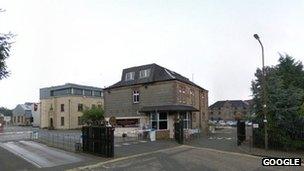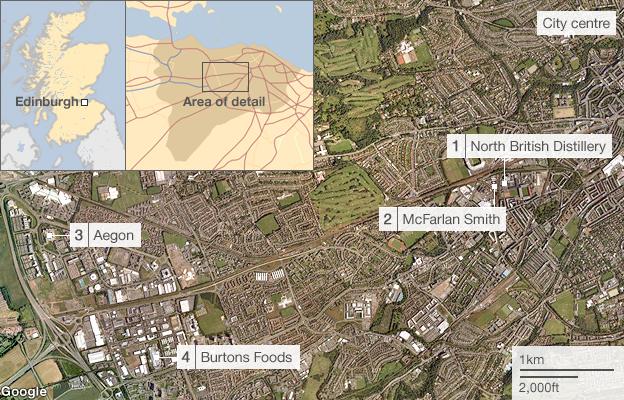Edinburgh Legionnaires' outbreak: Distillery shuts down cooling towers
- Published

Cooling towers at the distillery are among several sites tested in Edinburgh
Cooling towers have been shut down at a whisky distillery in Edinburgh which is at the centre of an investigation into an outbreak of Legionnaires' disease.
The Health and Safety Executive has served an improvement notice on the North British Distillery for alleged failures to adequately control the risk of legionella in one of its towers.
The company said it had taken its towers offline and halted production at its Gorgie plant as a precaution.
One man has died in the outbreak.
The Scottish government said there had been a further increase in the number of cases.
There were 28 confirmed and 46 suspected cases on Friday, an increase of 13 on the total number.
The North British Distillery, which was founded in 1885 and employs 100 people, is one of six sites being investigated by the Health and Safety Executive. It produces non-branded grain whisky for use in blends.
A number of cases of Legionnaires' disease have been confirmed in people who live and work near the site, which is in the west of Edinburgh beside Heart of Midlothian's Tynecastle stadium.
The only confirmed death in connection with the outbreak is that of 56-year-old Bert Air, who worked on a building site a short distance from the distillery.
The HSE said its improvement notice related to one cooling tower, but that the company had chosen to take all three towers out of operation.
"The notice was served for a failure to devise and implement a sustained and effective biocide control programme in one cooling tower," said the HSE.
"Issuing the improvement notice does not mean that this cooling tower has been identified as the source of the outbreak.
"The source of the outbreak may never be conclusively identified, based on our experience from previous outbreaks."
The company has until 29 June to satisfy the HSE that appropriate controls have been put in place.
In a statement, a spokesman for North British Distillery said: "Our thoughts are clearly with the families of those affected by this situation.
"Ensuring the health and safety of our employees and the local community is our highest priority.
"Having reviewed the current situation, we have voluntarily taken our cooling towers offline until the legionella results from samples taken earlier this week are reported.
"While this precautionary operation is under way we have temporarily ceased distillation."
Infection signs
The company said industrial cooling towers were only one potential source of the infection.
The HSE said it was continuing to visit other premises as part of its investigation.
The BBC understands that the sites where tests have been carried out include the cooling towers at:
<bold>1. </bold>North British Distillery, Wheatfield Road, Gorgie
<bold>2. </bold>McFarlan Smith (pharmaceuticals), Wheatfield Road, Gorgie
<bold>3.</bold> Aegon (insurance), where towers are used to cool servers, in Lochside Crescent, South Gyle
<bold>4.</bold> Burtons Foods, Bankhead Place, Sighthill.
<bold>5.</bold> BAE Systems, Crewe Toll
Residents are being leafleted with information on the disease and what they should do if they are worried they could be at risk.
GPs have been provided with information on spotting the signs of infection and a dedicated NHS helpline has been set up on <bold>0800 0858 531</bold>.
The helpline had received almost 500 calls by Thursday evening.
Weekend peak
Fourteen people were in intensive care at 12:00 on Friday, with a further 30 being treated on general wards.
The people in the confirmed cases were aged between 33 and 76.
Health Secretary Nicola Sturgeon said it was "reassuring" that 10 people had been discharged from hospital.
"NHS Lothian continues to be very busy and contact has been made with other health boards in case capacity at other hospitals is required," she added.
Dr Duncan McCormick, consultant in public health medicine at NHS Lothian, said the increase was in line with predictions.
"We expect that the numbers of patients affected will peak over the weekend and then begin to fall as we move into the beginning of next week," he said.
"The majority of patients who are presenting now are also on the lower end of the sickness scale and are therefore more likely to be treated in the community with appropriate care than be admitted into hospital, meaning that they are also unlikely to have underlying health conditions."
Location of the test sites

- Published6 June 2012
- Published6 June 2012
- Published15 June 2012
- Published4 June 2012